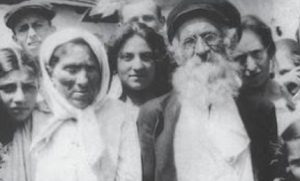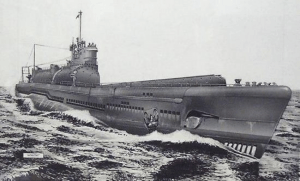Winner of the Fall 2016 StMU History Media Award for
Best Featured Image
Best Article in the Category of “United States History”
During the Great Depression and World War II, most Americans wanted to find happiness in anything. Throughout this era, there were not many places people could find happiness; so they began looking for entertainment in books. However, these were not just any ordinary types of books; they were indeed comic books.

Malcolm Wheeler-Nicholson was the founder of the first comic magazine, which was called New Fun. Although his comic did poorly, Malcolm was able to create a company called Detective Comics. The company was able to create a new magazine called Action Comics, founded in 1937.1 But before Malcolm was able to publish the new magazine, he fell into bankruptcy. Disregarding his personal setback, the company carried on without his involvement. The first issue in Action Comic was published in 1938. The comic consisted of an abnormal man who had incredible strength and wore a skintight suit, commonly known as Superman. In the span of a year, Superman had received his own book title and sold over 1.2 million copies per issue. It later became a radio show in 1940, opening with the phrase “It’s a bird! It’s a plane! No, it’s…Superman!”2 Eventually other publishers began developing their own superheroes as well. The second comic, which was produced in 1939, is the now popularly known comic series Marvel Comics. By 1940’s Superman was joined by other heroes such as: the Human Torch, the Sub-Mariner, Batman, the Flash, and Wonder Woman.3 In fact, Wonder Woman was meant to represent the importance of women in the war effort. During the boom of new superheroes being created, Superman was still the most popular of them all.

Unfortunately the comic industry was attacked by educators, psychiatrists, journalist, and even the federal government. They believed comics had no beneficial outcomes for society; instead of bringing entertainment, they were promoting ideas of violence and crime. They also believed that not only did the comics bring harmful thoughts to young minds, but the thin paper was supposedly destroying their eyesight.4 Despite the numerous complaints, Congress took no legal action against the publishers of the books. With this incident, it helped create a trade system, known as the Comic Codes, to help prevent indecency in the industry.5
No one could have guessed that comic books would have created some issues for years to come. For example, various art teachers discovered that the students who disliked and were performing poorly in art class, were the same students who had an interest in comic books; they were often getting into trouble for sketching comics instead of paying attention.6 The students wanted to get away from reality and what better way to do so than by creating your own story-line in a comic book?
That is the whole reason comic books were created, to help distract people from the tough times they were experiencing in life. That is why most people enjoyed them, because they wanted to escape reality by reading about situations that could never happen in real life, by flooding the minds of people of all ages with imagination. It is not hard to see why Americans would be very entertained by the concept of superheroes; they were created to help prevent disasters and to comfort those who were frightened by real-world events. For that reason this era was the perfect time for comic books to emerge. Some people were opposed to them, but in general they helped society in several ways. Although comics may not be as popular as they once were, it gave Americans a new world to discover, even if it was just imaginary.
- Alan Brinkley, American History: Connecting with the Past Volume 2, 15 edition (New York, NY: McGraw-Hill Education, 2014), 676. ↵
- Brinkley, American History: Connecting with the Past Volume 2, 676. ↵
- Brinkley, American History: Connecting with the Past Volume 2, 676. ↵
- Robert L. Coard, “The Comic Book in Perspective,” Peabody Journal of Education 33, no. 1 (1955): 18. ↵
- Brinkley, American History: Connecting with the Past Volume 2, 677. ↵
- Jay Berkowitz and Todd Packer, “Heroes in the Classroom: Comic Books in Art Education,” Art Education 54, no. 6 (2001): 12. ↵



118 comments
Alexander Manibusan
This article was so much fun to read! My personal favorite superhero has always been Superman and I’m glad that I now understand some of the parts into the making of Superman and the other heroes found in both marvel and detective comics. That is so outrageous- educators and psychiatrists believed that comics were bad and that the thin paper caused eye problems. Such slander! Why would they make such statements?! I’m very glad, however, that comics have continued and that they still are a form of entertainment that many enjoy.
Tyanne Pearcy
This article touched on a very popular origin of how superman came about. The topic was a very good idea to choose as it is very enticing. I am very intrigued in the fact that superman and the comics made about him were during the great depression . What was shocking to me is how these comics were talked about in a negative connotation. Yes these comics did slow down productivity but it was productive in helping people escape from harsh reality into a more positive space.
William Ward
I did not know much about the origins of superman until reading. One thing that I am even more curious about is why the people believed that comic books were hurting people’s eyes because of how thin the pages are? Just goes to show how far people will go to shut something down they do not like. Nice article, well written.
Valeria Perez
I had never questioned where superhero’s story came from. I would have never thought that at its inception so many diverse group of people would be against comic books! It is really interesting though to see how a failed comic (New Fun) developed into better stories and characters people could relate to and places they could escape, to now one of the biggest movie industries of the world!
Raymond Munoz
This article is very enlightening to the fact that comic books serve more purpose than to just make money and play with ones imagination. I agree with the fact that comics aren’t as popular as they once were but I believe it’s because kids just aren’t in to reading as they once were. During the Great Depression books were basically the “tv escape” for that generation of people but as we have advanced in technology kids look to their screens for a world of imagination. As a kid I never read a lot of comics but I did watch a lot of the cartoons that were based of the comics and ultimately felt the same great escape from watching the heroes save the day. Reading comics may not be the most popular but the ideas behind them are. Really great and informative article!
Katherine Watson
I understand as to why philosophers and educators had a problem with comic books in its time, although violence was a given theme in most works of art, but to try to take legal action against them is a bit much in my opinion. The imagination and creativity that was held in those books were so much easier to understand and deal with compared to the times that the world was facing when these were first being published. Comic books hold a dear place in my heart, and I am very grateful that I did not live in times when they were first hitting the market. Still, I would give anything to back in time to that point in history to express my opinion on the topic, even though no one would have probably listened to me given that I am a woman.
Jose Fernandez
This is a very interesting article! Even though I am a huge Superman fan, I had no idea about its origin. I would have never guessed that people liked to read comics during WW2 and I get why it was so hard for them to become popular. I think it is very important to find out more about the origins of the things we like; specially because it gives you a different perspective.
Richard Morales
I never knew the history of Superman and now I have more respect for the comic book community. It’s awesome how this source of entertainment was used to comfort Americans during the World War II era. It interests me how physicians claimed the this paper would harm a persons eyes. I also don’t understand the claims about the violent nature of the comic books having a negative impact on readers since there were worse events occurring in the real world news.
Saira Castellanos
Thats cool that people would escape through comic books. I did not know that, but i did know people would read to escape, like people do now, but i had never heard of people reading comic books instead. I remembered the movie Waiting for Superman. The movie was nothing about superman, but just waiting for heroes to come that are like superman. The author basically gave superman comic book a role in the real world. I loved it great article.
Maria Esquivel
It’s interesting to read that comic books were used as a resource to get away from reality. I never thought about comic books being an escape for so many people. I am glad that these books provided an escape to so many and inspired many to create their own world and their own superheroes. I now have a better understanding of comic books and how they can help people through hard times. Great Job!